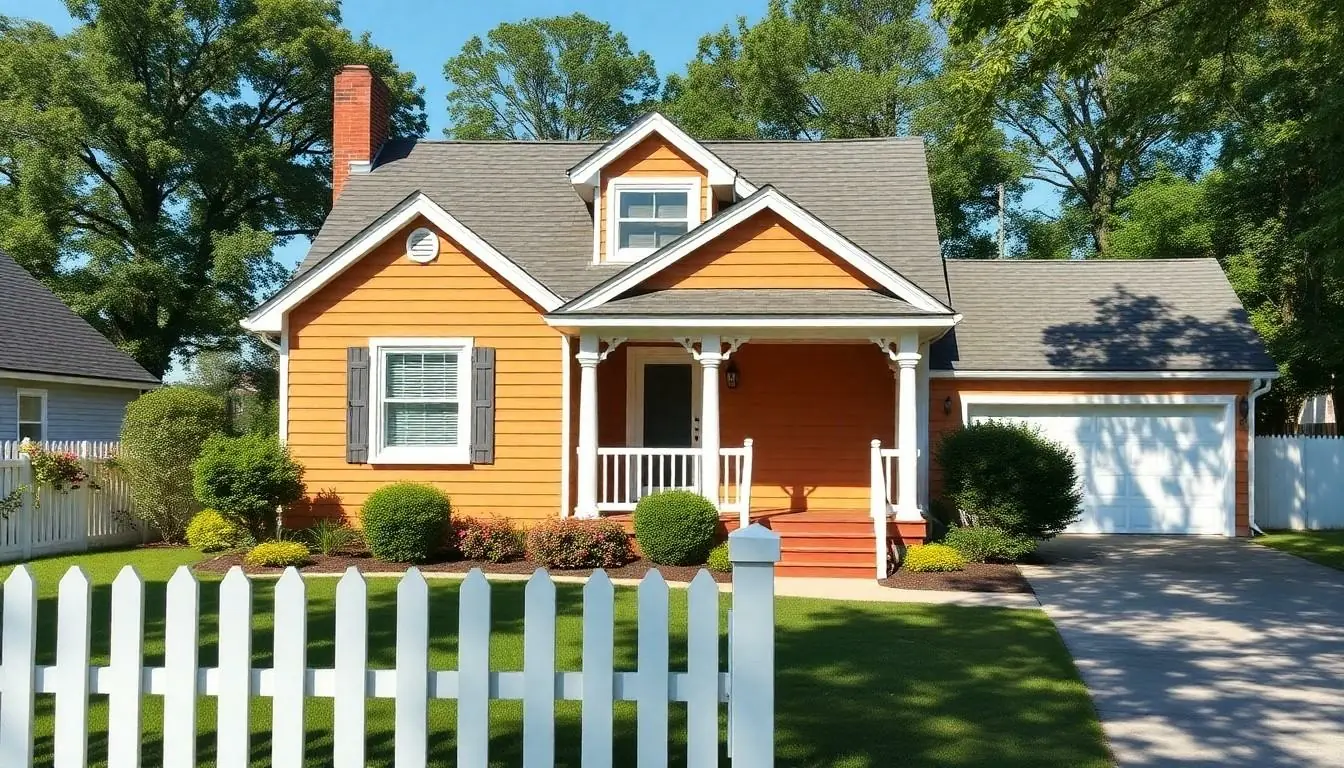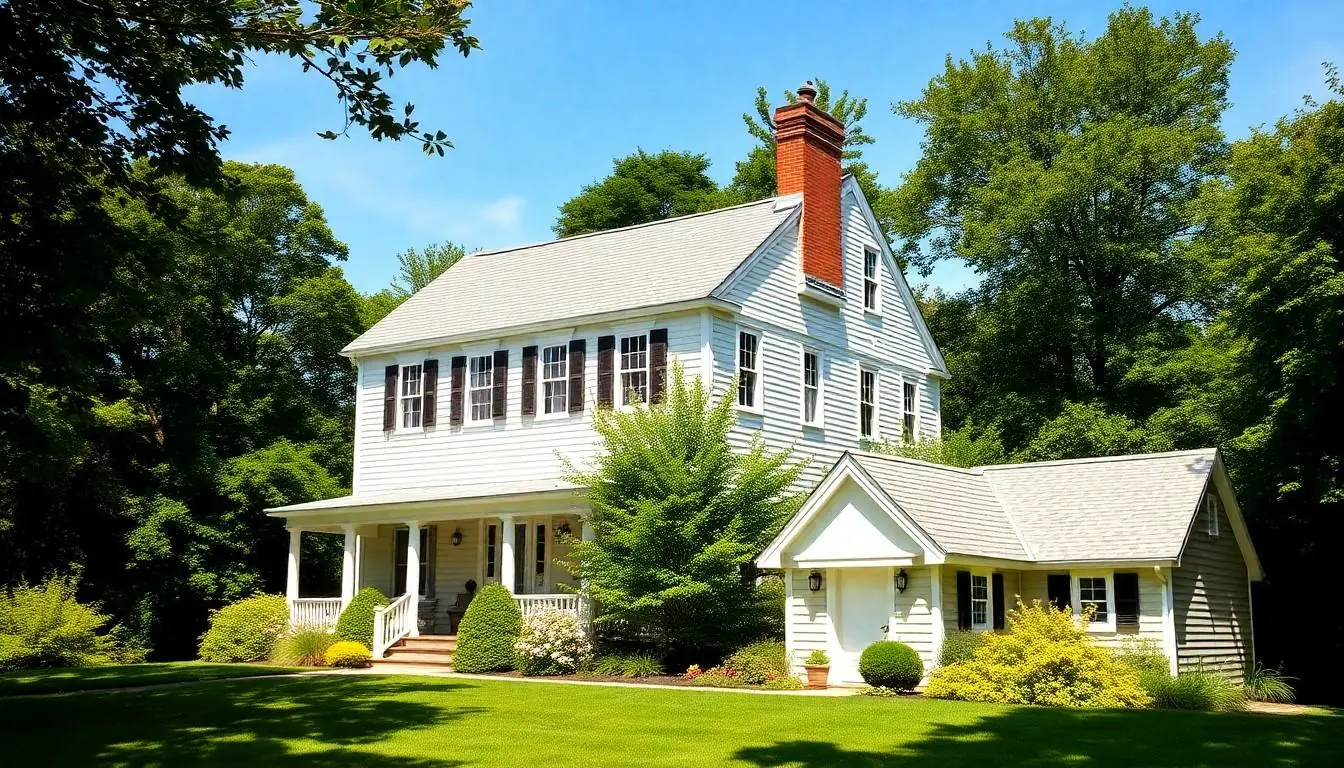In the land of coffee milk and clam cakes, homeowners in Rhode Island know that protecting their slice of paradise is no laughing matter. But let’s face it—who said insurance has to be boring? When it comes to Rhode Island homeowners insurance, it’s all about securing that cozy beach cottage or charming colonial against the unexpected.
Table of Contents
ToggleOverview of Rhode Island Homeowners Insurance
Rhode Island homeowners insurance provides essential coverage for property owners against risks such as fire, theft, and natural disasters. This insurance typically includes dwelling coverage, personal property protection, liability coverage, and additional living expenses in case homes become temporarily uninhabitable.
Homeowners in Rhode Island must assess their properties’ specific needs. Many policies cater to unique features of homes in the area, like flood insurance for coastal properties. Understanding coverage limits and exclusions is crucial for effective protection and peace of mind.
Insurance premiums in Rhode Island can vary based on several factors, including location, property value, and chosen coverage levels. On average, homeowners pay between $800 and $1,200 annually for basic policies. Local insurance agents often recommend obtaining multiple quotes to find the best rates tailored to individual circumstances.
While the picturesque state holds various attractions, climate risks like hurricanes and winter storms necessitate adequate coverage. Rhode Island homeowners might also consider endorsements for added protection, such as coverage for special valuables or personal liability enhancements.
Understanding deductibles is vital as well. Higher deductibles usually lower premium costs but require a more substantial out-of-pocket expense during a claim. Evaluating the financial implications ensures responsible long-term planning.
Lastly, regular policy reviews are essential. Changes in property value or improvements made to homes could necessitate adjustments in coverage to ensure sufficient protection against potential losses. Homeowners are encouraged to stay informed and proactive about their insurance needs for better security.
Types of Coverage Available

Homeowners insurance in Rhode Island provides several types of coverage tailored to protect against various risks. Understanding these coverage options enables homeowners to make informed decisions about their policies.
Dwelling Coverage
Dwelling coverage protects the physical structure of a home, including walls, roof, and foundation. This coverage applies to damages caused by events like fire, storms, or vandalism. Homeowners should ensure the coverage limit reflects the rebuilding cost of their home. Policies also typically cover attached structures, such as garages or decks. Assessing these structures can reveal unique risks in specific areas, allowing for adequate coverage.
Personal Property Coverage
Personal property coverage safeguards belongings within the home, ranging from furniture to electronics. This type of insurance applies when belongings are damaged by covered causes, such as theft or water damage. Homeowners often benefit from an actual cash value policy, accounting for depreciation, or a replacement cost policy, which provides full value without depreciation. Keeping an updated inventory of personal belongings aids in ensuring proper coverage and simplifies the claims process.
Liability Coverage
Liability coverage protects homeowners in the event of a lawsuit for injury or property damage occurring on their property. This protection extends to incidents involving pets and includes defense costs if a claim arises. Standard policies often provide coverage limits starting at $100,000, though higher limits can be added for better protection. Keeping liability coverage sufficiently high reduces personal financial risk and offers peace of mind for homeowners.
Factors Affecting Premiums
Premiums for Rhode Island homeowners insurance hinge on several critical factors. Understanding these can lead to more informed decisions when selecting coverage.
Location and Risk Assessment
Location plays a significant role in determining insurance premiums. Coastal properties face a higher risk of flooding, prompting the need for additional policies like flood insurance. Urban areas may see higher crime rates, influencing the cost of coverage, while rural locations might present fewer risks but could also have limited insurer options. Insurance companies assess these factors closely before quoting premiums.
Home Characteristics
Home characteristics also impact premium costs significantly. The age of a property affects its susceptibility to damages, with older homes often incurring higher premiums due to outdated materials or systems. The construction type, such as brick versus wood, influences fire resistance and durability. Additionally, security features like alarms or reinforced doors can lead to lower rates. More unique home features, such as swimming pools, may raise premiums due to increased liability risks.
Credit Score Considerations
Credit score considerations are essential in premium calculations. Insurers often review credit histories, believing that individuals with higher scores are lower risk. A solid credit score often correlates with responsible financial management, leading to more favorable premiums. Conversely, a low score can result in higher costs or even denied coverage. Maintaining a good credit profile can help homeowners secure better rates.
Tips for Choosing the Right Policy
Choosing the right homeowners insurance policy in Rhode Island requires careful consideration of several factors. It’s essential to tailor coverage to fit individual home needs and risks.
Assessing Coverage Needs
Determining specific coverage needs starts with evaluating the property’s value and features. Homeowners should consider dwelling coverage to protect against risks such as fire and theft. Personal property protection is vital for safeguarding belongings, while liability coverage reduces financial risks associated with injuries on the property. Recognizing added risks—like those from coastal flooding—leads to appropriate decisions about flood insurance. Reviewing and updating these assessments regularly protects homeowners as their circumstances change, ensuring adequate coverage always.
Comparing Insurance Providers
Shopping around for insurance providers helps homeowners find the best policy. Gathering multiple quotes from different companies allows for a thorough comparison of coverage options and rates. Factors such as customer service reputation and claims process efficiency can impact satisfaction significantly. Researching each provider’s financial stability ensures long-term reliability. Reading reviews and seeking recommendations often leads to valuable insights. Ultimately, understanding the terms and conditions of each quote empowers homeowners to make informed decisions that match their needs.
Rhode Island homeowners insurance is more than just a policy; it’s a vital tool for protecting valuable investments. By understanding the various coverage options and the factors influencing premiums, homeowners can make informed decisions that best suit their needs. Regularly reviewing and adjusting policies ensures that coverage remains adequate as circumstances change.
Staying proactive about insurance not only offers peace of mind but also safeguards against unexpected events. With the right approach and a bit of research, homeowners can secure the protection they need while navigating the unique challenges of insuring properties in this beautiful state.







